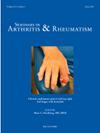基于信息和通信技术的自身免疫性炎症性风湿病患者教育:范围综述
IF 4.6
2区 医学
Q1 RHEUMATOLOGY
引用次数: 0
摘要
本综述旨在了解现有的基于信息和通信技术(ICT)的自身免疫性炎症性风湿病患者教育,并确定关键的有效性因素和专业人员指南。我们设计了检索策略,以确定 2011 年 1 月至 2023 年 10 月间发表的基于 ICT 的自身免疫性炎症性风湿病患者教育,重点关注类风湿性关节炎、强直性脊柱炎和系统性红斑狼疮。数据提取由两名审稿人根据资格标准进行独立筛选。结果 在 13861 条记录中,有 18 条符合资格标准。大多数研究都是随机对照试验,主要在美国进行,重点关注类风湿关节炎。基于信息和通信技术的干预措施包括基于网络的平台,旨在改善自我管理和用药依从性,大多数干预措施都有显著改善。网站、聊天机器人等数字工具很常见。研究确定了代表信息和通信技术功能的五组:数字化自我管理工具、多媒体学习材料、个性化教育课程、行为改变和移情游戏,以及互动在线社区和同伴支持。结论 基于信息和通信技术的患者教育在加强自身免疫性炎症性风湿病患者的自我管理和行为改变方面具有巨大潜力。本文章由计算机程序翻译,如有差异,请以英文原文为准。
Information and communication technology-based patient education for autoimmune inflammatory rheumatic diseases: A scoping review
Objective
This review aimed to map the existing the information and communication technology (ICT)-based patient education for autoimmune inflammatory rheumatic diseases and identify key effectiveness factors and guidelines for professionals.
Methods
A scoping review systematically reviewed PubMed, Cochrane library, EMBASE and Web of Science. We designed search strategies to identify ICT-based patient education for autoimmune inflammatory rheumatic diseases focused on rheumatoid arthritis, ankylosing spondylitis, and systemic lupus erythematosus, published between January 2011 and October 2023. Data extraction was independently screened by two reviewers according to the eligibility criteria.
Results
Of 13,861 records, 18 met the eligibility criteria. Most studies were randomized controlled trials, primarily conducted in the USA, focusing on rheumatoid arthritis. ICT-based interventions included web-based platforms, aiming to improve self-management, medication adherence, with most interventions showing significant improvements. Digital tools such as websites, chatbots were common. Five groups representing the ICT functions were identified: digital self-management tools, multimedia learning materials, personalized educational sessions, behavior change and empathy games, and interactive online communities and peer support. Most studies lacked theoretical frameworks, or guidelines for developing patient education.
Conclusion
ICT-based patient education has significant potential for enhancing self-management and behavior changes in patients with autoimmune inflammatory rheumatic diseases.
求助全文
通过发布文献求助,成功后即可免费获取论文全文。
去求助
来源期刊
CiteScore
9.20
自引率
4.00%
发文量
176
审稿时长
46 days
期刊介绍:
Seminars in Arthritis and Rheumatism provides access to the highest-quality clinical, therapeutic and translational research about arthritis, rheumatology and musculoskeletal disorders that affect the joints and connective tissue. Each bimonthly issue includes articles giving you the latest diagnostic criteria, consensus statements, systematic reviews and meta-analyses as well as clinical and translational research studies. Read this journal for the latest groundbreaking research and to gain insights from scientists and clinicians on the management and treatment of musculoskeletal and autoimmune rheumatologic diseases. The journal is of interest to rheumatologists, orthopedic surgeons, internal medicine physicians, immunologists and specialists in bone and mineral metabolism.

 求助内容:
求助内容: 应助结果提醒方式:
应助结果提醒方式:


